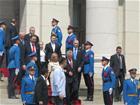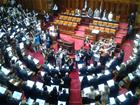Deny And Conquer
Dessislava Dimitrova, June 10, 2012
 Is there a pilot in the plane?
Is there a pilot in the plane?
There is no such thing as presidency in Serbia. At least this is the feeling one gets when entering the official website of the country’s president, as currently there is no information available at all but a brief notice that the official presentation of the president is under development. Several weeks ago, the visitors of the website would only see an announcement that it would be renewed after the presidential elections. The facts are – the new president has been elected, he put an oath before Parliament and his inauguration is to take place on Monday, June 11th. As it seems, however, no one, not even Tomislav Nikolic himself, believe that he will be a president in the next five years.
In an interview for Montenegro’s state-run TV broadcaster RTCG recently Nikolic said that apparently the media had not been aware that he would be the new president and that was why they behaved inadequately. There could be some truth in the statement, as only a few weeks ago everyone expected that Boris Tadic would be able to secure a third term in office. The truth is, however, that obviously Nikolic was also surprised by his own victory and this could be the explanation for his behaviour in the first days after his election, which not only the media saw as inadequate.
“Tomislav Nikolic started his term with statements which triggered discontent in the region”, is just one of the headlines which could be seen recently in the press across the region. In the same interview Nikolic provoked harsh reactions, first with his statement that the town of Vukovar was not a Croatian town, and then with his remarks that there was no genocide in Srebrenica. The result was more or less expected: neither Croatia’s President Ivo Josipovic nor the current chairman of the tripartite presidency of Bosnia and Herzegovina, Bakir Izetbegovic, will attend Nikolic’s inauguration. The only leader of a neighbouring country who will attend the ceremony will be Montenegro’s president Filip Vujanovic (as for Montenegro, Nikolic himself said last week that despite the fact that the country was independent it was not a separate nation and its citizens did not differ at all from the Serbs). On the other hand, the inauguration in Belgrade would be attended by EU Enlargement Commissioner Stefan Fule.
‘’Unfortunately, Nikolic’s positions, which he reiterated in his first public appearance – starting with the statement that Vukovar is a Serbian town and to that no genocide was committed in Srebrenica - are far from the European values”, Josipovic backed his decision following a meeting on Wednesday in Zagreb with Kosovo’s  President Atifeta Jahjaga. Before that, the Croatian president several times made it clear that cooperation between the two countries depended on the political will of the two counterparts and that the new Serbian president should show in practise that he was sticking to the EU values. Izetbegovic’s motive not to attend the ceremony was that in his opinion Nikolic’s statement on Srebrenica was insulting.
President Atifeta Jahjaga. Before that, the Croatian president several times made it clear that cooperation between the two countries depended on the political will of the two counterparts and that the new Serbian president should show in practise that he was sticking to the EU values. Izetbegovic’s motive not to attend the ceremony was that in his opinion Nikolic’s statement on Srebrenica was insulting.
A step backwards, backwards, backwards
According to local analysts, Nikolic’s statements could not be defined as gaffes but were rather a part of his political ideology which, although having undergone some cosmetic corrections, is basically the ideology of the Radical party. Beyond the country and the region, reactions were harsh as well. The Council of Europe’s Parliamentary Assembly issued a declaration, in which it stressed out that “by denying the 1995 genocide in Srebrenica, the newly elected President of Serbia, Tomislav Nikolic, has cast a shadow on the presidency,” and that “recognition of responsibilities by all sides in the conflicts that ravaged the territory of the former Yugoslavia between 1991 and 1995 is a precondition for reconciliation.”
According to the head of the Delegation of the European Union to Serbia Vincent Degert, the position of the EU was clearly explained by the spokesperson of the EC president. On June 4th, Jose Manuel Barroso’s spokesperson Pia Ahrenkilde Hansen defined Nikolic’s statement as "attempts to rewrite history". “The atrocities in Srebrenica in July 1995 were a crime against all humanity and we should never forget it, and we should never allow it to happen again,” Hansen said. “All leaders in the region have to take clear positions on crimes that were committed in the past, which were the worst crimes against humanity, “ Degert added.
 What would be Barroso’s reaction would become clear on June 14 when Nikolic is due to pay his first official visit to Brussels. Asked if Barroso was prepared to meet a genocide denier, Hansen was careful not to suggest that the visit be cancelled. A diplomat in Brussels told EurActiv that the EU was in a difficult situation. On the one hand, it did not want to “throw Serbia into the hands of Russia” but equally, “we either have values or we don’t”.Throwing Serbia into the hands of Russia is not an impossible scenario, Nikolic himself indicated. Although he has pledged during the election campaign and straight after his election that Serbia would stay on its EU path, his first visit after the elections was not in Brussels but in Moscow where on the sidelines of United Russia’s congress he met his Russian counterpart Vladimir Putin.
What would be Barroso’s reaction would become clear on June 14 when Nikolic is due to pay his first official visit to Brussels. Asked if Barroso was prepared to meet a genocide denier, Hansen was careful not to suggest that the visit be cancelled. A diplomat in Brussels told EurActiv that the EU was in a difficult situation. On the one hand, it did not want to “throw Serbia into the hands of Russia” but equally, “we either have values or we don’t”.Throwing Serbia into the hands of Russia is not an impossible scenario, Nikolic himself indicated. Although he has pledged during the election campaign and straight after his election that Serbia would stay on its EU path, his first visit after the elections was not in Brussels but in Moscow where on the sidelines of United Russia’s congress he met his Russian counterpart Vladimir Putin.
Only parts of the conversation between the two are enough to confirm that the tango Nikolic is dancing is not two steps forward and one backward, but only backwards. “Serbia is on its way towards the EU, a long and unknown way. We are going to develop our country under the existing rules in the EU“, Nikolic said after meeting Putin, adding that so far the recognition of Kosovo’s independence was not put as a precondition for EU accession but if it was to be put this would mean “an immediate end of the accession talks”. He addressed Putin with the words: “You are Serbia’s favourite due the way in which you lead the Russia,” and with the acknowledgement that he would lose elections only if Putin was to be his opponent.
The US State Department also condemned Nikolic’s remarks. In a media statement the department’s spokesperson Mark Toner said: "The United States deplores the statement made by newly elected Serbian President Tomislav Nikolic denying genocide in Srebrenica. Genocide in Srebrenica is not a subjective determination - it is a defined criminal act which the International Criminal Tribunal for the former Yugoslavia has confirmed in final and binding verdicts in multiple cases. The International Court of Justice also has concluded that genocide occurred in Srebrenica. It cannot be denied. President Nikolic has an opportunity to set a constructive tone within the region, but such unfounded statements about Srebrenica and other war crimes are counterproductive to promoting stability and reconciliation in the region. We call on all parties to take responsible actions in support of cooperation and reconciliation.”
The new scent on the Balkans
In his commentary for Bloomberg after May 6, when elections were held not only in Serbia but also in Greece, the British expert on the Balkans Tim Judah termed the two  votes as a tipping point in the history of the region, and the date - as the day Serbia ceded its place as the region’s most troublesome country to Greece. He also said that in the late 1800s, Otto von Bismarck was right to famously say that the next war in Europe would begin because of some “damned foolish thing in the Balkans.” Speaking of a next war in the Balkans might be too radical but obviously the scent in the region in the last few weeks has changed – not like in the film based on Gordana Kujic’s book “The Scent of the Rain on the Balkans” which tells the story of a Sephardi Jew family between the two world wars - but is definitely a different one.
votes as a tipping point in the history of the region, and the date - as the day Serbia ceded its place as the region’s most troublesome country to Greece. He also said that in the late 1800s, Otto von Bismarck was right to famously say that the next war in Europe would begin because of some “damned foolish thing in the Balkans.” Speaking of a next war in the Balkans might be too radical but obviously the scent in the region in the last few weeks has changed – not like in the film based on Gordana Kujic’s book “The Scent of the Rain on the Balkans” which tells the story of a Sephardi Jew family between the two world wars - but is definitely a different one.
Excluding the unsettled issue around Kosovo’s future, the most recent matter that triggered sparks between Zagreb and Belgrade took place last August when Serbia condemned the anniversary of the so called "Storm" military operation, which in Croatia is celebrated as a national holiday. Such sparks might appear this year too if the new Croatian prime minister decides to greet the former Croatian generals and military commanders of the operation, Ante Gotovina and Mladen Markac, sentenced by the International Criminal Tribunal for former Yugoslavia (ICTY) for war crimes.
What would Nikolic do in such a situation remains a mystery – as he used to be a defender of the former leader of the Radical party, also pressed with charges in the Hague Tribunal, but after leaving the party he began refusing to comment on his past related to Vojislav Seselj. It is clear, however, that the tone Nikolic is currently setting in relations with the neighbouring countries would bring no good neither for them nor for Serbia. And not only because of the critics of diplomats and top officials but for the people who still have painful memories from the last “foolish thing” on the Balkans 20 years ago.
 Bakir Izetbegovic, Andrej Plenkovic | © Council of the EU
Bakir Izetbegovic, Andrej Plenkovic | © Council of the EU Aleksandar Vucic, Recep Tayyip Erdogan | © Serbian Presidency
Aleksandar Vucic, Recep Tayyip Erdogan | © Serbian Presidency Jean-Claude Juncker, Zoran Zaev | © European Commission
Jean-Claude Juncker, Zoran Zaev | © European Commission